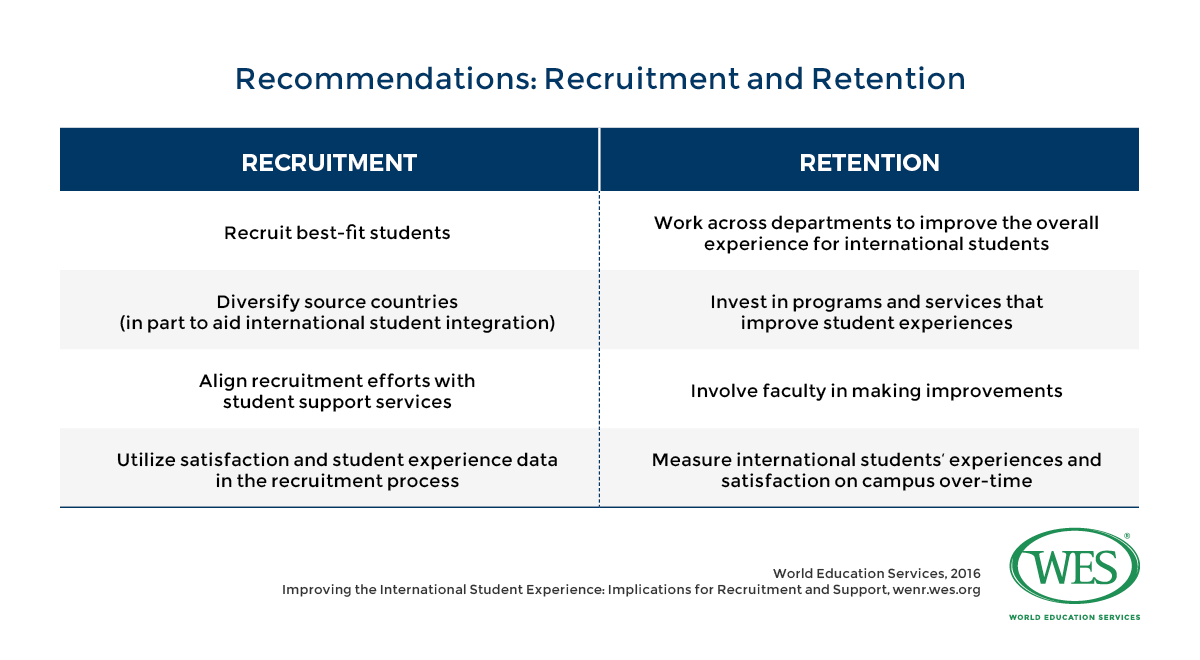Beyond the Basics: Top-Line Recommendations for International Student ‘First Responders’
Megha Roy, Zhengrong Lu, & Bryce Loo, Research Associates, WES
Student satisfaction, student success, and ongoing recruitment are all part of a virtuous cycle in higher education. This is every bit as true when it comes to international students as it is with the more general population.
And yet, real financial and regulatory constraints tend to limit the functions of campus offices that directly serve international students. For enrollment offices, the focus too often boils down to raw numbers (have we enrolled enough full-fee-paying international students?) rather than best fit — i.e., finding students whom the institution can support with a full range of services. For their part, International Student & Scholar Services tend to focus solely on visa compliance.
This narrow approach leaves much to be desired, both in terms of students’ needs and of opportunity loss from a recruiting perspective. The latest research from WES, Improving the International Student Experience: Implications for Recruitment and Support, suggests a definitive tie between international student well-being on campus and the success of future recruitment efforts. It’s with an eye on these realities that we’ve outlined a handful of recommendations for those who most often interface with international students, for support services offices that tend to have a non-international focus, and for faculty engagement.
Recommendations for Recruitment and Enrollment Personnel
- Think beyond the matriculation of international students onto campus but to look also at their experiences and the support that they receive. Satisfied students make for some of the institution’s best brand ambassadors and can play an important recruitment role just by word-of-mouth back in their home countries.
- It is important to ensure that recruitment efforts and support services align. For example, Chinese students often struggle with English language skills and making social connections with domestic students. If institutions plan on expanding or maintaining high levels of recruitment among Chinese students, there should be matching support services for, among others, English language learning and for assisting these students in developing meaningful connections with Americans and other international students.
- Diversify source countries. Not only can institutions create leeway for themselves when specific sources dry up or drastically shrink, but diversity of international students creates a better experience for all students. Too many students from any one country (often China) can inadvertently lead to fewer opportunities for students from these countries to make friends with American students. Instead, these students often simply spend time with each other, often almost exclusively, as if they never left home. Research consistently shows that international students integrate best when they form meaningful relationships with domestic students.
Recommendations for Student Support Services
- All student support service units, not just the International Student Services Office, need to play a role in the integration process for international students and ensure that they are successful and have a good experience. This means understanding and seeking to accommodate the needs of international students at a campus-specific level.
- Career Services is in need of special attention. Our research, as well as that of others, indicates that the Career Services Office and career-related issues in general are particularly important to international students. It also shows that these services are often the greatest source of dissatisfaction. In particular, the Career Services Office needs to focus greater attention on improving processes for helping international students securing short- or full-time work in the U.S. or abroad, including back home.
Recommendations for Faculty and Student Engagement
- Faculty members need training in advising and assisting international students. This is key because faculty members often misunderstand international students or misinterpret their behavior.
- On the flip side, international students greatly admire their professors overall, but may expect a lot from them. Many respondents to our survey on international student satisfaction said that they were unhappy with their access to faculty outside of the classroom. This may present an opportunity to help students hone their soft skills: the students themselves may benefit from coaching on how to best use office hours, and on how to approach faculty for help and advisement.
For further insight into WES research into international student satisfaction by country of origin, as well as the implications for recruitment and retention, download our October 2016 report, Improving the International Student Experience: Implications for Recruitment and Support.
